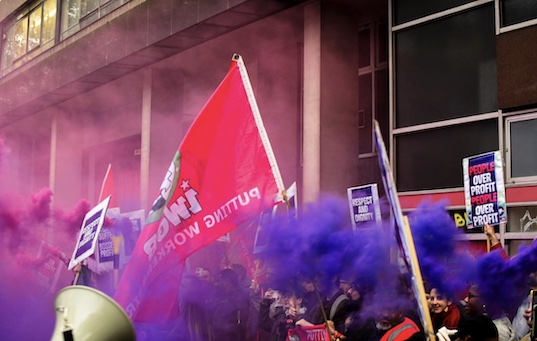Socialist Voice interviewed Celestino Pereira, a member of the Independent Workers Union
Socialist Voice: The IWGB is one of the most militant union in London. Why is that?
Celestino: Well, I’m not entirely familiar with the broader union landscape in London, but I can speak about unions connected to the courier sector, which is where I work. I can confidently say there’s no other union more active than the IWGB. I believe this is due to the members and organisers who build militancy through closer relationships with workers, outdoors and in direct contact. This approach is remarkable. The union supports effective direct action as a fundamental element of its struggles.
SV Can you tell us how long you were in the IWGB and the strikes you were you part of.
Celestino: I joined the union in February this year, after the food delivery couriers strikes in England. It was a massive strike, gained international attention, and caused financial losses for companies like Deliveroo, Uber Eats, and Just Eat. I was already involved in those strikes before joining the union, and I decided to become a permanent and more organised activist after seeing IWGB’s work firsthand.
Since then, I participated in the motorcade we organised during Deliveroo’s AGM. We picketed outside while some drivers managed to enter the meeting to directly present their demands to the CEO and shareholders.
More recently, I joined the picket line for the Ecourier workers strike, which is ongoing. They have incredible potential to see their demands met because of strong coordination between the union and workers, with significant engagement from IWGB members who work at Ecourier. Although I don’t work for that company directly, I’ve been actively supporting this struggle alongside my colleagues and am very optimistic about it.
SV: How does the IWGB build its passion and militancy amongst the precarious workers?
Celestino: The union operates across various sectors, divided into branches, each of which functions independently. I belong to the Couriers and Logistics branch, and I can say there’s great solidarity among members. It’s a mutual support system.
The union organises many activities and events, such as workshops, lectures, and cultural gatherings, which all members are invited to participate in. This creates strong bonds, as members interact and learn about the needs and struggles of other branches. Reciprocal support emerges from these interactions, building a powerful and active unity.
SV Can you tell us how many nationalities there are in the IWGB.
I don’t know the exact number, but I’ve interacted with people from nine different nationalities. I’m certain there are many more. The union is officially bilingual (English and Spanish), as there’s a significant Latin American community. Recently, there’s also been a surge in Brazilian members, like myself, joining this community.
Is the IWGB looking to expand?
Although the union’s headquarters and largest membership base are in London, its reach isn’t confined to the city. There are active members in many other parts of the UK, and I’ve had the opportunity to meet several of them when they travelled to London for this year’s AGM.
I’m currently in Liverpool and have already connected with other members here. I intend to strengthen our organisation in this region.
For more information please see. IWGB
If you’re trying to reach a specific person but don’t know their email, you can email the office address and we’ll forward it on.
Phone
We normally answer the phone from 9am to 5pm on weekdays.
+44 2035 383 720 — English
+44 2034 907 530 — Spanish


